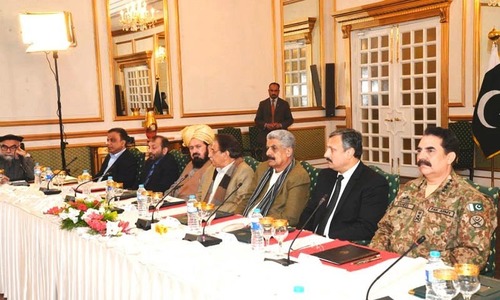ISLAMABAD: The two major opposition parties — the Pakistan Peoples Party (PPP) and the Pakistan Tehreek-i-Insaf (PTI) — are awaiting a government briefing on the issue of revival of the controversial military courts before holding internal discussions for taking a decision in this regard.
Talking to Dawn on Wednesday, leaders of both parties severely criticised the government for seeking the opposition’s cooperation only after the expiry of the law under which the military courts had been set up for trial of civilians charged with terrorism.
The opposition leaders also expressed their reservations over the government’s move to initiate consultations with political parties through the National Assembly speaker, instead of the prime minister or the law minister.
The military courts were allowed to try civilians accused of terrorism for two years in January 2015, soon after a terrorist attack on the Army Public School in Peshawar in December 2014, in which 144 people, mostly children, were killed by the banned Tehreek-i-Taliban Pakistan’s militants.
The courts were given a constitutional cover as both houses of parliament passed the 21st constitutional amendment despite fears among lawmakers that the tribunals they were authorising would not be able to ensure due process to the suspects and might undermine democracy.
The first meeting of the parliamentary parties on the issue of revival of the military courts remained inconclusive on Tuesday. The mainstream parties appeared reluctant to give a green signal to the government to extend their tenure, which expired on Jan 7. The meeting was called by National Assembly Speaker Ayaz Sadiq.
The government is seeking an extension of two years for the military courts. Besides the opposition parties, the Jamiat Ulema-i-Islam-Fazl (JUI-F) and Pakhtunkhwa Milli Awami Party (PkMAP), which are allies of the government, also disagreed with the proposal.
It was decided that the parliamentary parties would meet again on Jan 17 when the government would provide reasons for extending the period of the military courts and a report on their two-year performance.
PPP spokesman Farhatullah Babar, when contacted, said that although the party in principle was against the extension of the military courts, the final decision in this regard would be taken after a thorough discussion at its top forums, including the central executive committee (CEC).
Mr Babar, who had earlier spoken in the Senate on the matter, said a thorough analysis should be made as to how many of those sentenced to death by the military courts were ‘jet-black’ terrorists for whom they had been set up in the first place.
The procedure and collection of evidence in these courts should also be examined, he said, adding that it should be investigated whether some people kept at internment centres in Khyber Pakhtunkhwa had also been sentenced to death.
Mr Babar said 35 internees had disappeared from the Malakand centre and only seven of them had been produced before the Supreme Court.
“There is no place for military courts in a democratic polity,” he added.
Talking to reporters, Leader of the Opposition in the National Assembly Syed Khurshid Shah said a meeting of the PPP’s CEC would be held after the government’s briefing.
Mr Shah also criticised the government’s decision to withdraw subsidy on fertilisers and warned that the PPP would protest in and outside parliament against “anti-farmers” policies.
PTI vice-chairman Shah Mehmood Qureshi told Dawn that the party had already put six questions before the government for the next meeting. He said his party would decide to accept or reject the proposed reinstatement of military courts in view of the government’s reply.
He said he would put the whole situation before his party’s leaders after getting the government’s response.
Mr Qureshi said the government had failed to implement the National Action Plan (NAP) against terrorism and to form a much-desired national security committee of parliament as promised by it.
He said it was strange that the government wanted the cooperation of the opposition whereas it had failed to muster the support of its own allies, as both the JUI-F and the PkMAP had shown reluctance in supporting the military courts.
The PTI leader said the government had been allowed to set up the military courts for two years on the condition that it would bring reforms in the justice system. However, he said, the government had failed to introduce any reform.
Published in Dawn, January 12th, 2017














































Dear visitor, the comments section is undergoing an overhaul and will return soon.